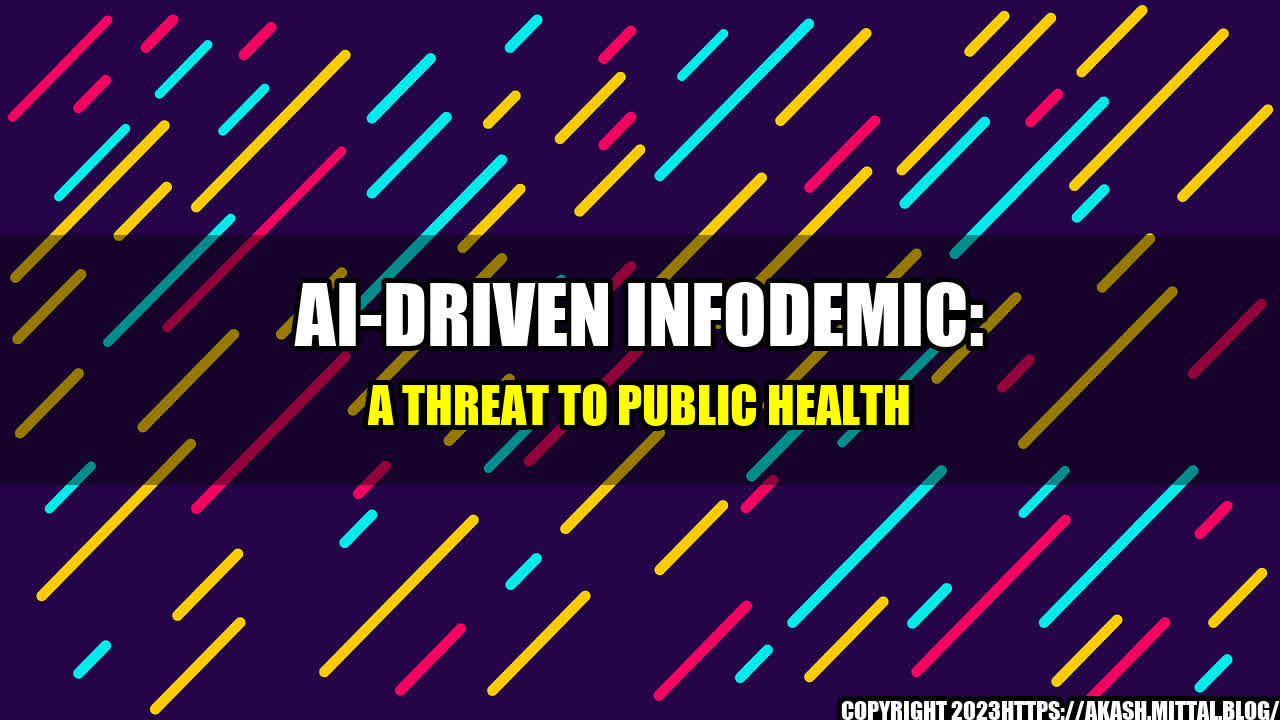AI-Driven Infodemic: A Threat to Public Health

On March 11, 2020, the World Health Organization (WHO) declared COVID-19 a global pandemic. In the midst of this crisis, people all around the world started to look for information about the virus to keep themselves informed and safe. Unfortunately, the rise of artificial intelligence-driven (AI-driven) infodemic made it difficult for the public to access accurate and reliable information.
What is an AI-driven Infodemic?
An infodemic is an overabundance of information – some accurate and some not – that makes it difficult for people to find trustworthy sources and reliable guidance. AI-driven infodemic refers to a situation where automated systems, such as bots and algorithms, generate and disseminate inaccurate or misleading information about a particular topic or event. The proliferation of social media platforms has made it easier for these systems to reach and influence a wider audience.
Examples of AI-Driven Infodemic on Public Health
The COVID-19 pandemic has been a fertile ground for AI-driven infodemic. According to a study, between January and March 2020, there were over 2000 COVID-19-related conspiracy theories circulating online. Not only that, but some online platforms used AI-driven bots to promote false cures, rumors about vaccines, and conspiracy theories about the origins of the virus.
One example is the infamous "Plandemic" video, which claimed that the COVID-19 pandemic was a hoax and that vaccines were dangerous. The video was widely shared on social media platforms like Facebook and Twitter, and despite being banned several times, it continued to appear on different websites and platforms.
The Danger of AI-Driven Infodemic in Public Health
The consequences of AI-driven infodemic in public health can be severe and long-lasting. If people are not able to find accurate information about a particular health issue, they may end up making harmful decisions that could put their health at risk. For instance, people who believe in conspiracy theories about vaccines may refuse to take them, leading to the resurgence of dangerous diseases like measles.
Furthermore, AI-driven infodemic can also erode the public's trust in official sources of information, such as public health agencies. When people are bombarded with conflicting or fake information, they may become skeptical about the information provided by official sources and may choose to rely on unverified and potentially harmful sources instead.
How to Combat AI-Driven Infodemic in Public Health
Combatting AI-driven infodemic in public health requires a collective effort from different stakeholders. Here are some practical tips:
- Encourage media literacy skills: One of the best ways to combat AI-driven infodemic is to teach people how to distinguish between reliable and unreliable sources of information. Media literacy programs can help people learn how to evaluate information critically and recognize common strategies used by misinformation campaigns.
- Strengthen regulation of social media platforms: Social media platforms play a crucial role in disseminating information about public health issues. However, they also provide a platform for misinformation campaigns. Regulators should ensure that these platforms are held accountable for disseminating false information and take appropriate measures to address these issues.
- Collaborate with trustworthy sources: Public health agencies should collaborate with trustworthy sources, such as academic institutions, to disseminate accurate and reliable information about public health issues. By promoting these sources, public health agencies can help people find credible information and reduce the impact of AI-driven infodemic.
In Conclusion
AI-driven infodemic poses a significant threat to public health. By disseminating false information and eroding the public's trust in official sources of information, AI-driven infodemic can put people's health at risk. Fortunately, there are practical steps we can take to combat this issue, such as promoting media literacy skills, strengthening regulation of social media platforms, and collaborating with trustworthy sources.
Curated by Team Akash.Mittal.Blog
Share on Twitter Share on LinkedIn